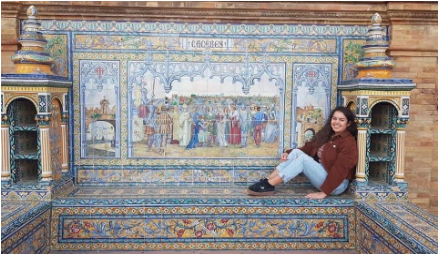This post is part of our Research Initiation Scheme for 2020-2021.
Evie Domingue is an MRes in Arts and Humanities candidate, whose research focuses on representations of Afro-Brazilian women in the media and the ways they represent themselves in their own media productions. In this interview, I speak with Evie about, amongst other things, her reasons for pursuing research on this topic, the strong sense of urgency it holds in Brazil’s current socio-political context, and her advice for those thinking of doing an MRes.
Prior to postgraduate study, Evie completed her BA Hons in Spanish and Portuguese at Queen’s University Belfast. She cites the ‘Brazilian Digital Culture’ module that she completed in her final year, taught by her MRes supervisor Dr Tori Holmes, as having sparked her interests for both media and Brazilian studies. It also gave her the opportunity to incorporate her passion for race studies into the aforementioned topics. She notes that the independent study she completed as part of this module gave her insight as to what was to come for the MRes.

In terms of methodology, Evie is analysing various forms of media – a YouTube channel, music, a film, a streaming platform and a telenovela (serial drama) – and picking up on the most prominent themes within this material. She notes that whilst her project is still developing and evolving, so far she has found recurring topics in her research material to be issues of identity, black aesthetic standards in the realm of self-representation, and black female protagonism.
I ask Evie about how she feels her project fits within Brazil’s current circumstances, i.e. its right leaning political administration, and posited that it gives her topic even more of a sense of urgency and relevance. She agrees that it does, and that these issues go beyond Brazil and become of global relevance when we consider the Black Lives Matter movement. Scholarship on representations of Afro-Brazilian women in the media is increasing, she notes, and that this is important in counteracting white male dominance in media spheres. She found that her passion for race studies also made it all the more important for her personally to pursue this topic.
Evie has found one of the most interesting aspects of her research so far to be the prevailing influence of white colonialism, and how stereotypes that we associate with modernity actually date back to Brazil’s colonisation, such as the sexualisation of black women in Brazilian society. Evie is interested in the ways in which discussions about race differ in Brazil when compared to the U.K., for example, as well as the similarities in these conversations that Brazil and the U.S. share, particularly in the ways that Afro-Brazilians and African Americans use social media and the internet.
In terms of practical advice for prospective MRes students, Evie highlights the importance of organisation and making sure that you choose a topic that you’re passionate about. She also stresses the importance of finding a balance between studies and having a job, and that knowing your own boundaries with work is important for this. She treats her research schedule like a 9-to-5 day because she personally feels more productive in the mornings, and also finds that having a regular routine helps her to set specific times in which she can have proper breaks. Within this routine, Evie finds it helpful to set herself weekly tasks so that she’s constantly having something to work towards, but also considers it important to just take every day as it comes.
Interview by Eleanor Gilmore, final-year undergraduate in Spanish and Portuguese